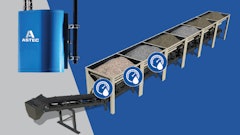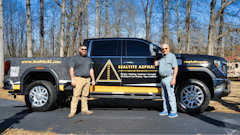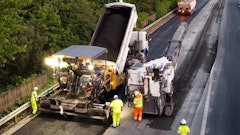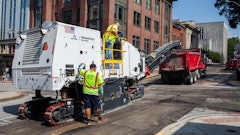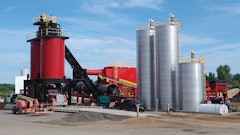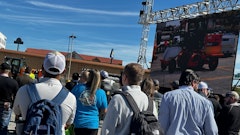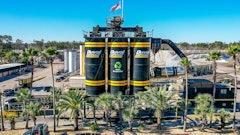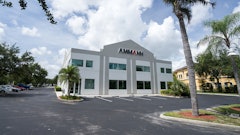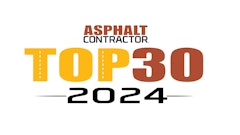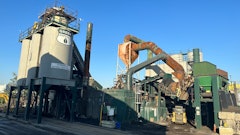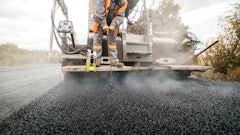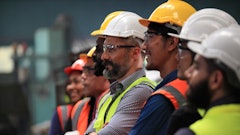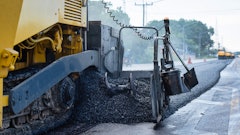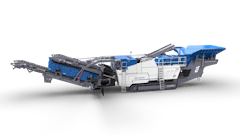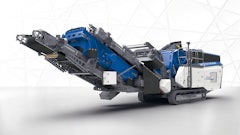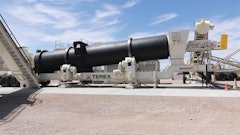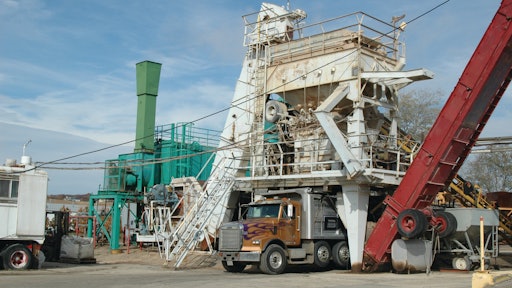
Dave Strassman, owner of DRS Ltd. located in Middleton,WI, has spent the last few decades turning his Cedar Rapids Batch Plant into a personally modified production facility suitable for producing his specialty mixes. After countless retrofits unique to the plant, Strassman has created a Willy Wonka-like plant producing asphalt for DRS paving projects.
Originally built in the late 1960s, Strassman purchased the plant in 1973. Currently, the plant produces an average of 35,000-40,000 tons of asphalt each year consisting of rubber, porous and polymer modified mixes. DRS primarily produces mixes for its own crew completing 30 percent private work, 50 percent commercial/industrial work, and 20 percent municipal work.
Utilizing plant modifications
As Strassman became more involved in creating his own mix designs he continuously made modifications to the asphalt plant. “The most important changes I have made to the plant have been for efficiency and the ability to produce all of the mixes with a push of the button,” he says.
In order to maintain quality control when producing the high performance of mixes, Strassman is currently installing a new control system that will allow him to produce and document any mix with the press of a button. “We are in the process of installing a state of the art control trailer that will bring our facility into the future,” Strassman says.
Currently, DRS is able to blend and produce almost every grade of AC with its polymer modification system. “We are able to produce warm mix, recycled asphalt shingles, reclaimed asphalt pavement, rubber and porous mixes,” he says. “The plant can run as a batch or drum with an over screen diversion system. We can preheat any of the ingredients, and our bag house is over-sized with additional expansion chambers.”
Unlike some producers, DRS has chosen to outsource the grinding of RAS materials due to pricing. The company currently used by DRS was able to produce the material at a lower price than what it cost DRS to grind it onsite, and the outsourced company was also successful at preserving the quality of RAS produced.
Strassman also uses a company to produce RAP materials for similar reasons including a competitive price as well as quality materials. The company comes to the DRS facility at the beginning of the year grinding up the material. This has added efficiency to the plant because it reduces the amount of equipment on site that must be maintained as well as reduces the number of man hours necessary to produce the materials.
A few of the plant modifications it has seen include adding bins with a feed systems for rubber, fiber and polymer materials in order to accurately weigh each additive to produce consistent high quality mixes.
A plant by the mixes
Utilizing specialized mixes has continuously set DRS apart from its competitors. Currently, the five most popular mixes including standard hot mix asphalt, both surface and binder, rubberized mix, porous mix and polymer modified cold mix.
The rubberized asphalt mix was the first specialized mix produced by DRS, and Strassman patented it in 1995. “Take an overlay for example, as asphalt ages it shrinks and cracks allowing water to get underneath it and losing its strength,” Strassman says. “It’s a compounding type of failure. One option is to tear the asphalt out after it reaches its useful purpose and replace it with new asphalt. Instead, we wanted to develop a product that was more flexible and resistant to cracking. That was when we developed our rubberized asphalt.”
Strassman The Parking lot was designed 25 years ago for automobile traffic but was now receiving heavy truck traffic used the rubberized mix on an old parking lot project that needed to be completely repaved. “I talked the owner into using a rubber overlay over the worst part of the parking lot. It is still in good shape maintaining it with high quality crack fill.”
Now, when DRS completes an overlay using the rubberized asphalt they get minimal cracking extending the life of the pavement. Qualities of the rubberized asphalt mix include more flexibility and durability with respect to the freeze/thaw cycle and less susceptible to cracking. It also adheres better to previous surfaces when installing overlays. “Our rubberized mix design uses the dry process,” he says. “It is our best performing mix with a three year warranty. We have produced and laid over 250,000 tons of this mix.”
Strassman has seen such success with the rubberized mix that it carries a 3-year warranty. The use of that mix is continuing to grow in demand making up roughly 75 percent of material used on DRS’ private projects and 10-15 percent of material used on commercial projects.
About six years ago Strassman expanded his mixes to include a porous mix, and it has continued to see steady growth. “Porous asphalt was relatively new and untapped in our market,” he says. “In the beginning it was about 1 percent of the material we produced and now it up to 5 percent produced.”
DRS has completed several large trail projects using 100 percent porous asphalt. In total, DRS has produced 25,000 tons of porous asphalt. To ensure the best material is produced, Strassman continues to monitor the condition of the pavements as they age.




